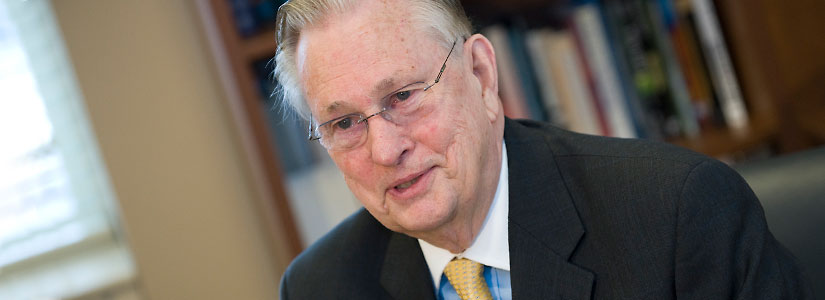The global engineer
The global engineer
| Author: | Arden Bement Inaugural Director, Purdue’s Global Policy Research Institute Director, National Science Foundation (2004-10) |
|---|---|
| Magazine Section: | Our People, Our Culture |
| College or School: | CoE |
| Article Type: | Issue Feature |
| Feature Intro: | At no other time in the history of the world has there been a greater need for engineers to inform public policy makers by proposing policy alternatives and analyzing potential policy consequences. |
Consider these advancements: credit cards, cell phones, bar codes, ATM machines, the internet, laptop computers, personal GPS receivers, CCD cameras, electronic readers, hybrid and “flex-fuel” cars, and many other technologies that are now taken for granted throughout the world. Today, two people with “generation 4,” cell phones can communicate face to face from any two places on the Earth, with few exceptions.
In this ever shrinking world, there is both increasing public awareness and expectation for scientific and technological solutions to grand-challenge, global issues, such as climate change, pandemics, population growth, urbanization, biodiversity loss, invasive species, hunger, recovery from natural disasters, and the potential depletion of essential natural resources, among others. At no other time in the history of the world has there been a greater need for engineers to inform public policy makers by proposing policy alternatives and analyzing potential policy consequences.
Interdisciplinary approaches are essential to better understand the interrelationships among social, economic, and technological factors inherent in policy changes. New computational methods and capacities that include new mathematics and algorithms are needed to address these highly complex, coupled problems and their “nasty,” emergent properties.
Global changes also bring new challenges and opportunities:
- Affordable, clean, renewable energy generation, storage systems, smart grids, smart meters and conversion processes to improve energy efficiency, displace fossil fuels, and sequester carbon dioxide.
- New materials concepts to offset elements in future limited supply for advanced electronic devices, displays, control systems, and catalysts.
- New concepts for retrofitting urban infrastructures and lifelines to meet the needs of population growth, increasing urbanization, and natural disaster impacts.
- New global manufacturing and supply chains to meet the growing complexities of expanded word trade, enterprise integration and multi-modal, multi-channel distribution.
- Reverse engineering the brain to discover “natural bridges” between human and machine cognition to further optimize machine-assisted human functions.
- Building engineering capacity and confidence building in the developing world for indigenous problem solving.
This short list illustrates the increasing opportunities for globally savvy engineers in the laboratory, boardroom, government office, legislative staff, and international marketplace. Purdue’s Engineer of 2020 initiative builds on the National Academy of Engineering’s 2004 study Engineer of 2020. It provides an excellent blueprint for educating the global engineer for the 21st century with its emphasis on entrepreneurship, leadership, and the ability to work in diverse and multicultural environments.
In our rapidly changing world, both the private and public sectors will look for engineers with interest and experience in public policy. They will count on them to assume top leadership roles as we adapt to our changing and shrinking world.
Arden Bement
Inaugural Director, Purdue’s Global Policy Research Institute
Director, National Science Foundation (2004-10)

Comments